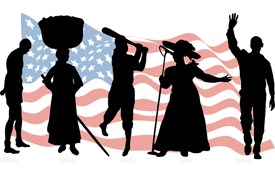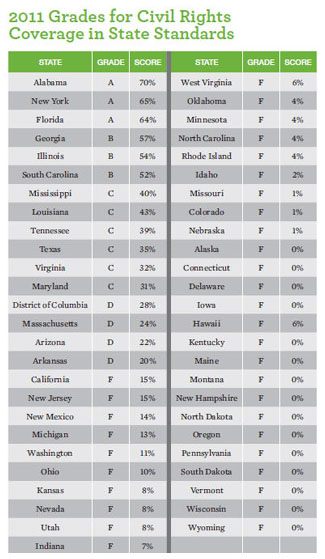0 The Crisis in USA Black History Education
- Education
- by Hugh Smith
- 09/28/2011

 A memorial on the National Mall in Washington, DC dedicated to Martin Luther King Jr. is great, but beyond King and Rosa Parks, a black history knowledge gap is growing among USA high school students, as only 2% of seniors in 2010 knew important facts about Brown versus the Board of Education, the landmark US Supreme Court decision from 1954.
A memorial on the National Mall in Washington, DC dedicated to Martin Luther King Jr. is great, but beyond King and Rosa Parks, a black history knowledge gap is growing among USA high school students, as only 2% of seniors in 2010 knew important facts about Brown versus the Board of Education, the landmark US Supreme Court decision from 1954.
what’s behind this pathetic statistic? State education standards are ignoring civil rights history.
Southern states are doing the best. Northeast and western states are doing the worst.
The Southern Poverty Law Center has conducted a first of its kind study (September, 2011) about how African American history relating to civil rights is taught in high school.
Take a look at the graph to see who is at the head of the class.
Each state sets different expectations for teachers and students. Only 35 states (including the District of Columbia) required study of the civil rights movement as part of their state-mandated standards, framework or curriculum.
To compare state performance, the SPLC study stressed knowledge content across 6 categories resulting in 85% of a state’s score:
- Events
- Leaders
- Groups
- Causes (history)
- Obstacles
- Tactics
So what specifics should high school students know according to the SPLC framework?
- The civil rights movement was a movement composed of many individuals and was not the initiative of any single person or small group of people.
- All students should learn about Martin Luther King Jr. and Rosa Parks, but students should learn about at least six additional figures in the civil rights movement.
- Students should be able to identify major groups involved in the civil rights movement, including CORE, SCLC and SNCC.
- Students should be able to identify key events in the civil rights movement and place them in the correct order (Brown v. Board of Education, Little Rock, Freedom Rides, Montgomery Bus Boycott, 24th Amendment, Birmingham bombings and protests, March on Washington, 1964 Civil Rights Act, Freedom Summer, Selma-to-Montgomery march, 1965 Voting Rights Act, Watts and other uprisings, 1968 Civil Rights Act and assassination of Martin Luther King Jr.
Many more elements are included in the SPLC recommendations. You can read Teaching the Movement: The State of Civil Rights Education in the United States 2011 or download a pdf version of the document.
2018 update: This study was updated in 2014. The link above now goes to the 2014 study and the original 2011 report.